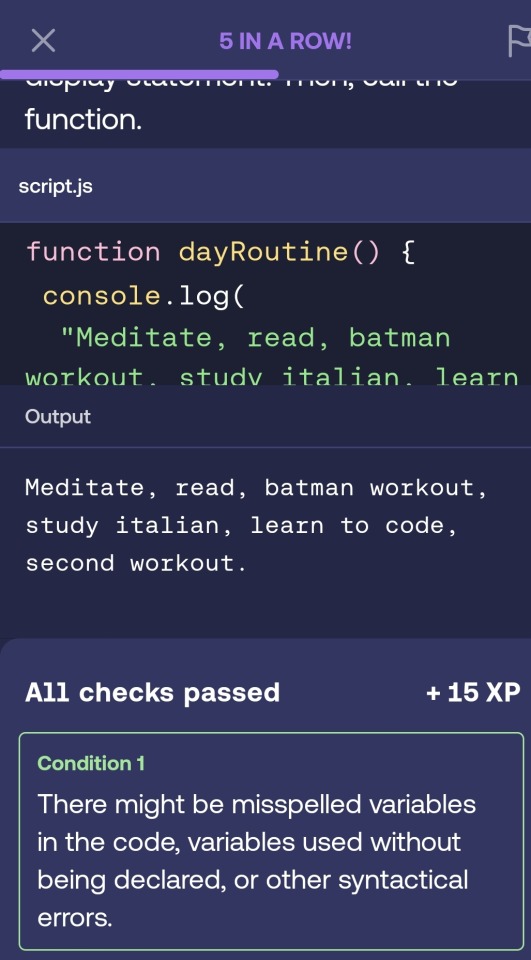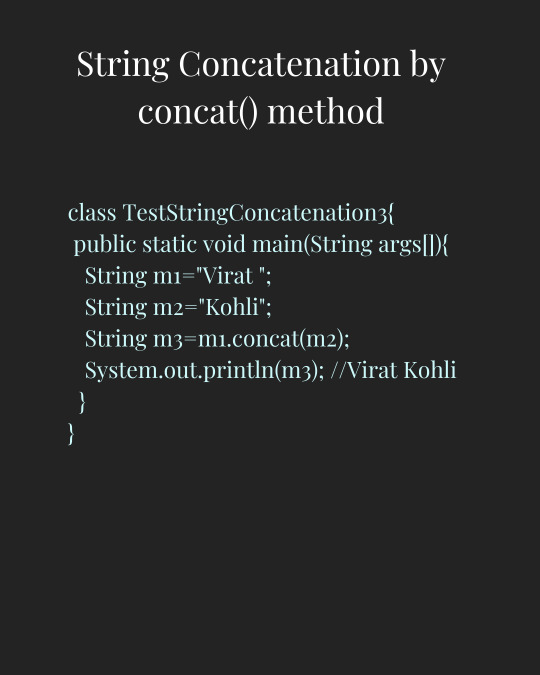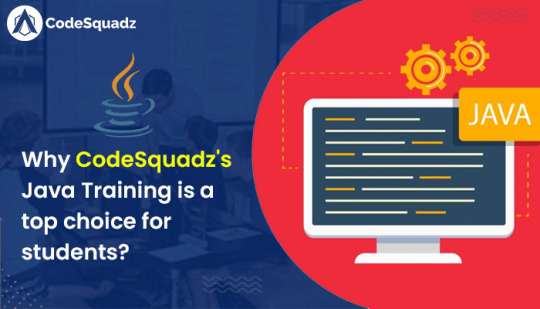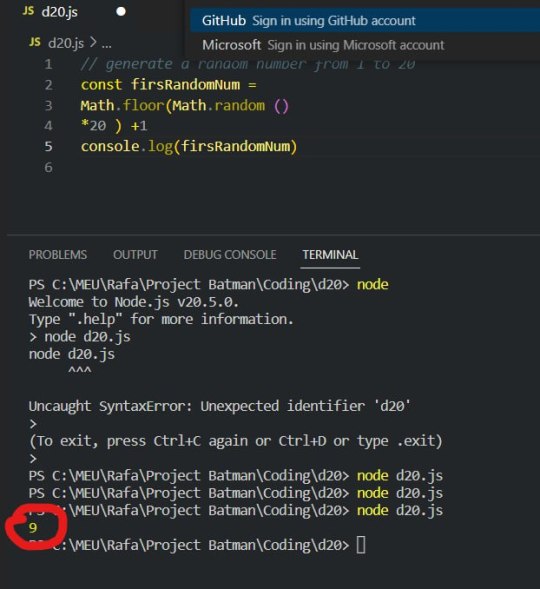#java training program
Explore tagged Tumblr posts
Text
Latest Java Trends You Should Know in 2024

Join the CodeSquadz Java training program to learn Java from industry experts and master its concepts. Its growth puts the language in high demand, making expertise in the current Java trends essential for both freshers and experienced developers.
#java programming language#Latest Java Trends#features of java in codesquadz#java scope in future#Java training program
0 notes
Text
#best java internship in delhi#java training in delhi#learn java by manish bhatia#java training program
0 notes
Text
2 notes
·
View notes
Text
Which is better full stack development or testing?

Full Stack Development vs Software Testing: Which Career Path is Right for You?
In today’s rapidly evolving IT industry, choosing the right career path can be challenging. Two popular options are Full Stack Development and Software Testing. Both of these fields offer unique opportunities and cater to different skill sets, making it essential to assess which one aligns better with your interests, goals, and long-term career aspirations.
At FirstBit Solutions, we take pride in offering a premium quality of teaching, with expert-led courses designed to provide real-world skills. Our goal is to help you know, no matter which path you choose. Whether you’re interested in development or testing, our 100% unlimited placement call guarantee ensures ample job opportunities. In this answer, we’ll explore both career paths to help you make an informed decision.
Understanding Full Stack Development
What is Full Stack Development?
Full Stack Development involves working on both the front-end (client-side) and back-end (server-side) of web applications. Full stack developers handle everything from designing the user interface (UI) to managing databases and server logic. They are versatile professionals who can oversee a project from start to finish.
Key Skills Required for Full Stack Development
To become a full stack developer, you need a diverse set of skills, including:
Front-End Technologies: HTML, CSS, and JavaScript are the fundamental building blocks of web development. Additionally, proficiency in front-end frameworks like React, Angular, or Vue.js is crucial for creating dynamic and responsive web interfaces.
Back-End Technologies: Understanding back-end programming languages like Node.js, Python, Ruby, Java, or PHP is essential for server-side development. Additionally, knowledge of frameworks like Express.js, Django, or Spring can help streamline development processes.
Databases: Full stack developers must know how to work with both SQL (e.g., MySQL, PostgreSQL) and NoSQL (e.g., MongoDB) databases.
Version Control and Collaboration: Proficiency in tools like Git, GitHub, and agile methodologies is important for working in a collaborative environment.
Job Opportunities in Full Stack Development
Full stack developers are in high demand due to their versatility. Companies often prefer professionals who can handle both front-end and back-end tasks, making them valuable assets in any development team. Full stack developers can work in:
Web Development
Mobile App Development
Enterprise Solutions
Startup Ecosystems
The flexibility to work on multiple layers of development opens doors to various career opportunities. Moreover, the continuous rise of startups and digital transformation initiatives has further fueled the demand for full stack developers.
Benefits of Choosing Full Stack Development
High Demand: The need for full stack developers is constantly increasing across industries, making it a lucrative career choice.
Versatility: You can switch between front-end and back-end tasks, giving you a holistic understanding of how applications work.
Creativity: If you enjoy creating visually appealing interfaces while also solving complex back-end problems, full stack development allows you to engage both creative and logical thinking.
Salary: Full stack developers typically enjoy competitive salaries due to their wide skill set and ability to handle various tasks.
Understanding Software Testing
What is Software Testing?
Software Testing is the process of evaluating and verifying that a software product or application is free of defects, meets specified requirements, and functions as expected. Testers ensure the quality and reliability of software by conducting both manual and automated tests.
Key Skills Required for Software Testing
To succeed in software testing, you need to develop the following skills:
Manual Testing: Knowledge of testing techniques, understanding different testing types (unit, integration, system, UAT, etc.), and the ability to write test cases are fundamental for manual testing.
Automated Testing: Proficiency in tools like Selenium, JUnit, TestNG, or Cucumber is essential for automating repetitive test scenarios and improving efficiency.
Attention to Detail: Testers must have a keen eye for identifying potential issues, bugs, and vulnerabilities in software systems.
Scripting Knowledge: Basic programming skills in languages like Java, Python, or JavaScript are necessary to write and maintain test scripts for automated testing.
Job Opportunities in Software Testing
As the demand for high-quality software increases, so does the need for skilled software testers. Companies are investing heavily in testing to ensure that their products perform optimally in the competitive market. Software testers can work in:
Manual Testing
Automated Testing
Quality Assurance (QA) Engineering
Test Automation Development
With the rise of Agile and DevOps methodologies, the role of testers has become even more critical. Continuous integration and continuous delivery (CI/CD) pipelines rely on automated testing to deliver reliable software faster.
Benefits of Choosing Software Testing
Job Security: With software quality being paramount, skilled testers are in high demand, and the need for testing professionals will only continue to grow.
Quality Assurance: If you have a knack for perfection and enjoy ensuring that software works flawlessly, testing could be a satisfying career.
Automated Testing Growth: The shift toward automation opens up new opportunities for testers to specialize in test automation tools and frameworks, which are essential for faster releases.
Flexibility: Testing provides opportunities to work across different domains and industries, as almost every software product requires thorough testing.
Full Stack Development vs Software Testing: A Comparative Analysis
Let’s break down the major factors that could influence your decision:
Factors
Full Stack Development
Software Testing
Skills
Proficiency in front-end and back-end technologies, databases
Manual and automated testing, attention to detail, scripting
Creativity
High – involves creating and designing both UI and logic
Moderate – focuses on improving software through testing and validation
Job Roles
Web Developer, Full Stack Engineer, Mobile App Developer
QA Engineer, Test Automation Engineer, Software Tester
Career Growth
Opportunities to transition into senior roles like CTO or Solution Architect
Growth towards roles in automation and quality management
Salary
Competitive with wide-ranging opportunities
Competitive, with automation testers in higher demand
Demand
High demand due to increasing digitalization and web-based applications
Consistently high, especially in Agile/DevOps environments
Learning Curve
Steep – requires mastering multiple languages and technologies
Moderate – requires a focus on testing tools, techniques, and automation
Why Choose FirstBit Solutions for Full Stack Development or Software Testing?
At FirstBit Solutions, we provide comprehensive training in both full stack development and software testing. Our experienced faculty ensures that you gain hands-on experience and practical knowledge in the field of your choice. Our 100% unlimited placement call guarantee ensures that you have ample opportunities to land your dream job, no matter which course you pursue. Here’s why FirstBit is your ideal training partner:
Expert Trainers: Learn from industry veterans with years of experience in development and testing.
Real-World Projects: Work on real-world projects that simulate industry scenarios, providing you with the practical experience needed to excel.
Job Assistance: Our robust placement support ensures you have access to job openings with top companies.
Flexible Learning: Choose from online and offline batch options to fit your schedule.
Conclusion: Which Career Path is Right for You?
Ultimately, the choice between full stack development and software testing comes down to your personal interests, skills, and career aspirations. If you’re someone who enjoys building applications from the ground up, full stack development might be the perfect fit for you. On the other hand, if you take satisfaction in ensuring that software is of the highest quality, software testing could be your calling.
At FirstBit Solutions, we provide top-notch training in both fields, allowing you to pursue your passion and build a successful career in the IT industry. With our industry-aligned curriculum, expert guidance, and 100% placement call guarantee, your future is in good hands.
So, what are you waiting for? Choose the course that excites you and start your journey toward a rewarding career today!
#education#programming#tech#technology#training#python#full stack developer#software testing#itservices#java#.net#.net developers#datascience
2 notes
·
View notes
Text



Learning to code with Mimo has been quite fun, it's almost like a duolingo for coding, been ejoying it quite a bit and learning a lot.
#project batman#batman#bruce wayne#martial arts#training#exercise#fitness#work out#kung fu#duolingo#mimo#mimo learn to code#computer science#computer programming#coding#java script#node.js#learn to code#computer skills#tech savy#polymath
13 notes
·
View notes
Text

String Concatenation by concat() method
In Java, you can concatenate strings using the concat() method. This operator allows you to join two or more strings together. Here's how you can use it:
#javalanguage#javaprogramming#programming#coding#code#trending#education#technology#tech#training#engineering#software#development#softwaredevelopment#besttraininginstitute#online#onlinetraining#traininginstitute#tutorial#java
3 notes
·
View notes
Text
Understanding Object-Oriented Programming and OOPs Concepts in Java
Object-oriented programming (OOP) is a paradigm that has revolutionized software development by organizing code around the concept of objects. Java, a widely used programming language, embraces the principles of OOP to provide a robust and flexible platform for developing scalable and maintainable applications. In this article, we will delve into the fundamental concepts of Object-Oriented Programming and explore how they are implemented in Java.

Object-Oriented Programming:
At its core, Object-Oriented Programming is centered on the idea of encapsulating data and behavior into objects. An object is a self-contained unit that represents a real-world entity, combining data and the operations that can be performed on that data. This approach enhances code modularity, and reusability, and makes it easier to understand and maintain.
Four Pillars of Object-Oriented Programming:
Encapsulation: Encapsulation involves bundling data (attributes) and methods (functions) that operate on the data within a single unit, i.e., an object. This encapsulation shields the internal implementation details from the outside world, promoting information hiding and reducing complexity.
Abstraction: Abstraction is the process of simplifying complex systems by modeling classes based on essential properties. In Java, abstraction is achieved through abstract classes and interfaces. Abstract classes define common characteristics for a group of related classes, while interfaces declare a set of methods that must be implemented by the classes that implement the interface.
Inheritance: Inheritance is a mechanism that allows a new class (subclass or derived class) to inherit properties and behaviors of an existing class (superclass or base class). This promotes code reuse and establishes a hierarchy, facilitating the creation of specialized classes while maintaining a common base.
Polymorphism: Polymorphism allows objects of different types to be treated as objects of a common type. This is achieved through method overloading and method overriding. Method overloading involves defining multiple methods with the same name but different parameters within a class, while method overriding allows a subclass to provide a specific implementation of a method that is already defined in its superclass.
Java Implementation of OOP Concepts:
Classes and Objects: In Java, a class is a blueprint for creating objects. It defines the attributes and methods that the objects of the class will have. Objects are instances of classes, and each object has its own set of attributes and methods. Classes in Java encapsulate data and behavior, fostering the principles of encapsulation and abstraction.
Abstraction in Java: Abstraction in Java is achieved through abstract classes and interfaces. Abstract classes can have abstract methods (methods without a body) that must be implemented by their subclasses. Interfaces declare a set of methods that must be implemented by any class that implements the interface, promoting a higher level of abstraction.
Inheritance in Java: Java supports single and multiple inheritances through classes and interfaces. Subclasses in Java can inherit attributes and methods from a superclass using the extends keyword for classes and the implements keyword for interfaces. Inheritance enhances code reuse and allows the creation of specialized classes while maintaining a common base.
Polymorphism in Java: Polymorphism in Java is manifested through method overloading and overriding. Method overloading allows a class to define multiple methods with the same name but different parameters. Method overriding occurs when a subclass provides a specific implementation for a method that is already defined in its superclass. This enables the use of a common interface for different types of objects.
Final Thoughts:
Object-oriented programming and its concepts form the foundation of modern software development. Java, with its robust support for OOP, empowers developers to create scalable, modular, and maintainable applications. Understanding the principles of encapsulation, abstraction, inheritance, and polymorphism is crucial for harnessing the full potential of OOPs concepts in Java. As you continue your journey in software development, a solid grasp of these concepts will be invaluable in designing efficient and effective solutions.
#javascript#javaprogramming#java online training#oops concepts in java#object oriented programming#education#technology#study blog#software#it#object oriented ontology#java course
3 notes
·
View notes
Text
Java Learning Roadmap: From Basics to Mastery
Embarking on a Java learning journey from the comfort of your home offers unparalleled flexibility and convenience. Whether your aspirations lie in web development, Android app creation, or backend coding, Java serves as a robust foundation.

This comprehensive guide outlines a step-by-step approach to help beginners effectively grasp Java concepts and skills from the comfort of their own space.
1. Establish Clear Learning Objectives: Prior to diving into Java learning, take a moment to define your goals. Determine what you aim to achieve with your Java proficiency, whether it's gaining foundational knowledge, tackling projects, or pursuing a career in software development.
2. Select High-Quality Learning Resources: Choose your learning materials wisely. Opt for reputable online platforms such as Udemy, Coursera, or Codecademy that offer well-structured Java courses tailored to beginners. Supplement your learning with books, video tutorials, and interactive exercises to enhance comprehension.
3. Start with Fundamental Concepts: Begin your Java journey by focusing on fundamental principles. Familiarize yourself with core concepts like variables, data types, loops, conditionals, and object-oriented programming basics. Online tutorials and interactive exercises serve as invaluable resources for grasping these foundational elements.
4. Cultivate Regular Practice Habits: Consistent practice is key to mastering Java. Allocate dedicated time each day to code, solve programming challenges, and engage in project work. Platforms like LeetCode, HackerRank, and CodeSignal provide a plethora of coding challenges to hone your skills and build confidence.
5. Engage in Project Development: Apply your newfound knowledge by embarking on real-world projects. Start with simple tasks, such as creating a calculator, a to-do list app, or a basic game. As you grow more confident, tackle more complex projects that align with your learning objectives and interests.

6. Connect with the Java Community: Join online forums, discussion groups, and social media communities to interact with fellow Java enthusiasts and experts. Platforms like Stack Overflow, Reddit, and GitHub offer invaluable opportunities to seek advice, share knowledge, and gain insights from experienced developers.
7. Embrace Constructive Feedback: Don't shy away from seeking feedback on your code and projects. Embrace constructive criticism as a catalyst for growth and improvement. Participate in code reviews, collaborate with peers, and leverage online resources to continuously refine your Java skills.
8. Stay Abreast of Developments: Java is a dynamic language with frequent updates and advancements. Stay informed about the latest trends, tools, and technologies in the Java ecosystem by following industry blogs, attending webinars, and exploring new frameworks and libraries.
9. Explore Advanced Topics: Once you've mastered the basics, delve into more advanced Java topics such as multithreading, networking, and database connectivity. Advanced Java courses, tutorials, and books offer deeper insights into these complex concepts, enabling you to expand your skill set further.
10. Build a Stellar Portfolio: As your Java proficiency grows, assemble a portfolio to showcase your projects and achievements. A well-curated portfolio serves as a compelling demonstration of your skills and capabilities to potential employers or clients. Highlight your standout projects, provide detailed descriptions, and showcase your problem-solving prowess to make a lasting impression.
Conclusion: Learning Java from home is an enriching journey that empowers individuals to unlock countless opportunities in software development. By setting clear goals, leveraging quality resources, practicing consistently, and engaging with the Java community, you can confidently master this versatile programming language and chart a successful career path in technology. Remember, dedication, perseverance, and a genuine passion for learning are the driving forces behind your Java learning journey's success.
#technology#java#javaprogramming#javascript#computerscience#programming#developer#java course#java training#java training course
2 notes
·
View notes
Text

"Supercharge your career with our Java Training Course in Gorakhpur, where learning meets opportunity! Are you eager to master the Java programming language and secure a promising job placement? Look no further. Our comprehensive Java training program is designed to equip you with the essential skills and knowledge required for Java development. Not only will you become a Java expert, but we also ensure that you get a head start in your career with our placement assistance. Don't miss out on this chance to excel in Java and secure a bright future. Enroll in our Java Training Course today and pave the way for your professional success!" for more details https://uncodemy.com/course/java-training-course-in-gorakhpur/
2 notes
·
View notes
Text
How much do Java developers earn?
1. Introduction to Java Developer Salaries
What's the earning potential for Java developers? This is a hot topic for students, new grads, and folks looking to get into software development. With the growth of full stack dev, cloud tech, and enterprise software, Java remains essential. Salaries depend on location, experience, and skills. For students in Coimbatore studying Java, knowing what to expect in the industry is key.
Key Points:
- Java developers are in demand across various fields.
- Knowing Spring Boot and full stack skills can boost your pay.
2. Java Developer Salary for Freshers
So how much can freshers make? Entry-level Java developers in cities like Coimbatore usually earn between INR 3 to 5 LPA. Completing a Java Full Stack Developer course typically leads to better pay since it covers a wider skill set. Employers often look for hands-on experience, which is why doing Java mini projects or internships is important.
Key Points:
- Fresh Java developers start around INR 3 LPA.
- Getting certified in Java can help you land a job.
3. Experienced Java Developer Salaries
With 3-5 years under your belt, what can you expect? Salaries typically range from INR 6 to 12 LPA. Those who take a Java training course in Coimbatore often find they earn more. Companies want people with strong backend skills and experience with tools like Spring, Hibernate, or Microservices.
Key Points:
- Mid-level Java developers can earn between INR 6 to 12 LPA.
- Knowledge of Spring and REST APIs can increase your salary.
4. Senior Java Developer Salary
InsightsFor those at a senior level with over 7 years of experience, earnings can start at INR 15 to 25 LPA. This varies based on company size and responsibilities, plus keeping up with new tech is crucial. Attending weekend Java classes or coaching sessions can help keep skills fresh.
Key Points:-
- Senior Java developers generally earn over INR 15 LPA.
- Full stack skills can lead to higher pay.
5. Java Full Stack Developer Salaries
People who complete a Java Full Stack Developer Course in Coimbatore often snag higher-paying jobs. Full stack developers with skills in Java, React, and DevOps can earn about 20% more than those focused solely on Java. If you're curious about Java salaries, investing in full stack training is a smart move.
Key Points:
- Full stack Java developers can earn about 20% more.
- Having both frontend and backend knowledge is important.
6. Salary Trends in Coimbatore and Tier-2 Cities
In Coimbatore, students of Java courses often ask about earning potential. Starting salaries might be a bit lower than in metro areas, but there’s room for growth. Remote work options are now more common, allowing locals to earn metro-level salaries.
Key Points:
- Java jobs in Coimbatore offer competitive pay.
- Remote work opens doors to higher salaries.
7. Java Certification and Salary Growth
Getting certified can mean a 30-40% pay bump compared to non-certified peers. Following a structured Java course helps build strong skills. Recruiters appreciate learning paths and real-world experience from platforms offering Java programs.
Key Points:
- Java certifications help boost your credibility.
- Structured training can get you better job offers.
8. Demand for Java Developers in 2025
Looking ahead, there’s expected growth of 15% in Java jobs by 2025. More students are signing up for Java Full Stack Developer Courses in Coimbatore, and chances for freshers are expanding. Mastering Java basics through tutorials can help set you up for success.
Key Points:
- Job openings for Java developers are on the rise.
- Full stack training fits well with job market trends.
9. Java Developer Skills That Influence Salaries
Earnings for Java developers often depend on skills like Spring Boot, Microservices, REST APIs, and cloud integration. Regular practice with Java exercises, internships, and coaching can create a strong candidate.
Key Points:
- Skills in demand directly impact salary.
- Ongoing learning is vital for career growth.
10. Conclusion and Brand Mention
So how much do Java developers actually make? It varies, but with the right skills and certifications, Java can lead to a rewarding job. Whether you’re just starting out or looking to advance, getting good training is key. If you want to begin or progress in your career, check out Xplore It Corp for Java courses and training designed to help you succeed.
Key Points:
- Look for recognized training programs.
- Xplore It Corp can help you close skills and salary gaps.
FAQs
Q1. How much do Java developers earn after certification?
A certified Java developer can earn 30-40% more than non-certified ones.
Q2. Are Full Stack Developer salaries higher?
Yes, full stack developers generally make 20-25% more due to their wider range of skills.
Q3. Does location affect salaries?
Absolutely, metro cities tend to pay more, but remote jobs are helping close that gap in places like Coimbatore.
Q4. Is a Java internship necessary?
Not strictly necessary, but internships can really enhance a resume, especially for those just starting out.
Q5. What's the best way to learn Java step by step?
Join a structured course, like those from Xplore It Corp, and practice with Java tutorials and coding exercises.
#Java programming language#Object-oriented programming in Java#Java development tools#Java code examples#Java frameworks (Spring#Hibernate)#Java for web development#Core Java concepts#Java backend development#Java IDE (Eclipse#IntelliJ)#Java Virtual Machine (JVM)#Java syntax and structure#Java API integration#Java debugging tools#Java software applications#Java interview preparation#Java certification training#Java app development#Java database connectivity (JDBC)#Java deployment techniques#Enterprise Java development.
0 notes
Text
Master the Web: Enroll in the Leading Full-Stack JavaScript Course in Kochi with Techmindz
In today’s dynamic tech ecosystem, companies are actively seeking professionals who can work across the entire web development stack. JavaScript, with its powerful ecosystem (Node.js, React, MongoDB, and more), has emerged as the cornerstone of modern full-stack development. If you’re looking to build a high-demand skill set and kick-start your IT career, Techmindz offers the most industry-relevant Full-Stack JavaScript course in Kochi—crafted to turn beginners into job-ready developers.
🌐 Why Full-Stack JavaScript?
JavaScript is no longer confined to just frontend development. With platforms like Node.js and frameworks like React, Express, and MongoDB, you can build entire web applications using JavaScript from start to finish.
Key Benefits:
Single language across frontend and backend
High job demand in startups and enterprises
Faster development cycles
Easy to learn and community-supported
🏫 Why Choose Techmindz for Full-Stack JavaScript in Kochi?
Located at the heart of Kerala’s tech hub—Infopark, Kochi—Techmindz offers an immersive and mentor-led program that blends technical expertise with real-world project experience.
🚀 What You’ll Learn:
Frontend Development: HTML5, CSS3, JavaScript (ES6+), React.js
Backend Development: Node.js, Express.js
Database Management: MongoDB
Version Control: Git & GitHub
Deployment & Hosting: Netlify, Vercel, Heroku
Project Work: Build and deploy real-time applications (e.g., e-commerce site, task manager)
👨🏫 Features:
Live instructor-led sessions
Hands-on project development
Weekend and weekday batch options
Resume building, mock interviews, and placement support
🧑💻 Who Should Join?
This course is ideal for:
Freshers with a passion for web development
Working professionals looking to transition into full-stack roles
Freelancers and entrepreneurs creating web applications
Students aiming for internships in IT companies
You don’t need a computer science degree—just curiosity and commitment.
💼 Career Opportunities After Course Completion
Graduates of the Full-Stack JavaScript Course in Kochi from Techmindz can pursue roles like:
Full-Stack Developer
JavaScript Developer
React Developer
Backend Engineer (Node.js)
Web Application Developer
Techmindz alumni are now working in top-tier firms, thanks to our strong placement network and industry-focused curriculum.
⭐ What Makes This Course a Game-Changer?
“Techmindz didn’t just teach me to code—they trained me to think like a developer. The Full-Stack JavaScript course helped me build a portfolio and land a developer job in Kochi within 3 months.” — Sneha R., Web Developer at a Kochi Startup
“The curriculum is aligned with what startups actually use. React, Node, and Mongo were taught with depth, and we even worked on a real-world project. Highly recommend Techmindz!” — Arjun M., Freelance Full-Stack Developer
📍 Located in the Heart of Kochi’s Tech Zone
Techmindz is based in Infopark Kochi, giving students direct access to a live tech environment and professional exposure. Whether you prefer offline or online classes, our hybrid learning model ensures flexibility and effectiveness.
�� Enroll Now – Limited Seats Available!
Give your tech career the boost it deserves with a career-oriented Full-Stack JavaScript course in Kochi. At Techmindz, you learn by doing—and we ensure you walk out job-ready.
📞 Call Now or 💬 Visit www.techmindz.com to book a free consultation.
🏁 Conclusion
JavaScript is the language of the web—and mastering it from end to end is one of the smartest moves you can make today. With Techmindz’s specialized training, practical approach, and dedicated placement support, you're not just learning a language—you're launching a future. For those seeking a proven, professional, and practical Full-Stack JavaScript course in Kochi, Techmindz stands out as the top choice.
0 notes
Text
CodeSquadz’s Java Training is a top choice for students

Students can learn why CodeSquadz is one of the leading Java training institutes to kickstart their IT careers by knowing why they should enroll at CodeSquadz and learn Java programming language from an industry expert.
0 notes
Text
How to Start Your Journey in Computer Science

Introduction
Computer Science is one of the most dynamic and in-demand fields today. From mobile apps to AI, data analysis to cybersecurity, the scope of computer science is vast. For students wondering where to begin, the journey starts with building strong fundamentals.
Whether you're a school student or a graduate exploring your career options, learning core programming languages, data handling, and software skills is the first step. If you’re located in areas like Yamuna Vihar or Uttam Nagar, you’ll find a wide range of structured learning options available to get started on the right path.
1. Begin with Programming Fundamentals
The foundation of computer science begins with learning programming languages. Languages like C and C++ are ideal for beginners as they help build logic and understanding of how a computer processes instructions. Many students begin with:
C Classes or C++ Classes
C++ Coaching Instituteor nearby areas
These help you master the syntax, data types, control structures, and problem-solving skills necessary for advanced learning.
2. Advance to Object-Oriented Programming (OOP)
Once you’re comfortable with the basics, moving on to C++ and Java is a smart move. These object-oriented languages teach you how to write reusable code and develop software systematically.
Students often opt for:
C++ Training or Java Training
Java Coaching Institute for deeper concept clarity
Java Classes for hands-on project experience
These courses prepare you for real-world applications and interviews in software roles.
3. Strengthen Your Data Structure Knowledge
Knowing how to write code is just the beginning. Efficient coding depends on how well you understand Data Structures. This includes arrays, linked lists, stacks, queues, trees, and graphs.
If you're planning to enter software development, software engineering, or competitive programming, joining a good Data Structure Course in or a Data Structure Training Institute is essential.
You can also explore:
Data Structure Coaching Institute in Yamuna Vihar
Data Structure Classeswith live problem-solving sessions
4. Learn About Databases and Query Languages
Another important area is managing and retrieving data. SQL and MySQL are used in almost every application that stores data—from websites to mobile apps. Learning how to interact with databases gives you an edge.
You can begin with:
SQL Classes or SQL Classes
MySQL Training Institute or MySQL
Practical exposure through MySQL Coaching Institute or MySQL Coaching helps in writing efficient queries and understanding database management.
5. Explore Specializations like Web & App Development
Once you’re comfortable with basic coding and data handling, you can start exploring more specific fields. Web technologies like HTML, CSS, JavaScript, JSP, and frameworks like React or Angular are a great way to enter front-end or back-end development.
You’ll find JSP Coaching and JSP Coaching in Uttam Nagar useful if you're interested in Java-based web development.
6. Build a Strong Foundation with Computer Applications
If you’re starting from scratch or want a general overview, Diploma in Computer Application (DCA) and Advanced Diploma in Computer Application (ADCA) are valuable. They cover basic software tools, internet usage, data handling, and more.
Many students choose:
DCA Course or DCA Course
Advanced Diploma in Computer Application for deeper learning
Computer Application Coaching Institute for practical training
7. Practice and Build Projects
Learning theory is not enough. Building real-time projects—like calculators, mini games, websites, or management systems—helps you apply your knowledge and showcase your skills to future employers.
Join local Computer Science Training Institutes in Uttam nagar that focus on project-based learning. Hands-on experience not only strengthens your understanding but also boosts your confidence.
Final Thoughts
The journey into computer science is not a sprint—it's a step-by-step learning experience. Whether you’re looking for C++ Coaching , Data Structure Coaching, or even Computer Science Course, the key is to start with the basics and grow gradually.
Choose courses that focus on real-world applications, give you coding practice, and help you understand concepts deeply. The demand for skilled programmers, software developers, and data analysts is only growing. Now is the right time to begin your journey.
Suggested Links:
C++ Programming Language
Database Management System
Advanced Data Structures
Learn Core Java
#computer science course#computer science training#database management system#java training#C++ programming language course#advance Data structures course#python course in yamuna vihar#python course in uttam nagar
0 notes
Text
Programming Classes in Palam

Looking for top-notch Programming Classes in Palam? Agilo offers hands-on coding courses tailored for students and professionals alike. Whether you're a beginner or looking to upskill, our expert-led sessions cover Python, Java, C++, Web Development, and more. Located conveniently in Palam, Delhi, Agilo combines practical learning with real-world projects to help you build a strong programming foundation. Join hundreds of successful learners today!
📍 Visit us: https://g.co/kgs/oJc2Pjp 📞 Call: 99111 55156 💻 Learn. Code. Grow.
#Programming Classes in Palam#Coding Institute Palam#Agilo#Computer Classes in Palam#Learn Coding in Delhi#Python Training Palam#Web Development Palam#Java Classes Palam#Software Training Palam#IT Courses Delhi
1 note
·
View note
Text
How Coding Brushup Prepares You for Job-Ready Skills with Hands-On Industrial Training
In the fast-paced tech industry, having a degree is no longer enough to land a top job. Employers are now looking for professionals who are job-ready—individuals who can hit the ground running from day one. This is where Coding Brushup comes in. Through its job-oriented industrial training courses, Coding Brushup equips aspiring tech professionals with real-world skills that are in high demand across the industry.

Let’s explore how Coding Brushup’s hands-on training model ensures that students gain practical knowledge, build confidence, and become competitive candidates in the job market.
Bridging the Gap Between Education and Employment
Many traditional education systems focus heavily on theory and outdated curricula. This often leaves graduates unprepared for real-world challenges. Coding Brushup’s job-oriented industrial training course is specifically designed to address this gap by aligning with current industry standards and hiring expectations.
Unlike conventional classroom settings, Coding Brushup’s programs are structured to simulate real-world environments. Students are placed in project-based learning modules that teach them how to work in agile teams, solve complex problems, and deliver solutions that mirror real-world demands.
Why Job-Oriented Industrial Training Matters
The tech job market is highly competitive, especially in the United States. Whether you’re a college student, a recent graduate, or a career switcher, having hands-on experience is what truly makes a difference. A job-oriented industrial training course is a fast-track path to mastering tools, technologies, and workflows used by modern tech companies.
Coding Brushup integrates:
Practical coding assignments
Industry-specific projects
Soft skills training
Career mentorship
All of these components help learners develop job-ready skills that employers actively seek in today’s dynamic work environment.
Hands-On Training That Simulates the Workplace
At the heart of Coding Brushup’s approach is hands-on training. Students don’t just learn how to write code—they build actual applications, deploy websites, analyze data sets, and participate in collaborative development environments.
Key features of the hands-on training model include:
Live project work: Build apps and software used in real-world scenarios.
Code reviews: Learn to write clean, efficient, and scalable code.
Agile methodology: Work in sprints and scrums to simulate tech team workflows.
Version control systems: Get proficient with Git, GitHub, and CI/CD pipelines.
This level of immersion helps students develop not just technical expertise, but also the collaborative and critical thinking skills needed in the tech industry.
Real-Time Projects That Enhance Employability
One of the standout features of Coding Brushup’s job-oriented industrial training course is the opportunity to work on real-time projects. These are not academic exercises—they are complex, industry-simulated tasks that closely mimic what professionals face in their daily work.
Examples include:
Developing an e-commerce platform with payment integration
Creating a data visualization dashboard using Python and Power BI
Designing and launching mobile applications on Android/iOS
Building and deploying RESTful APIs for modern web apps
Such projects allow learners to build a strong portfolio that demonstrates their ability to deliver tangible results, which significantly increases their chances of landing interviews and job offers.
Customized Learning Paths for Different Tech Careers
Coding Brushup understands that one size doesn’t fit all. That’s why its job-oriented industrial training courses are tailored for various career paths, including:
Full-stack development
Data science and analytics
Cybersecurity
Mobile app development
Software testing and automation
Each course is structured with progressive modules that start from foundational concepts and advance to specialized topics, ensuring that students receive a comprehensive and personalized learning experience.
Career Services and Job Support
The support doesn’t end with training. Coding Brushup also offers career development services that help students transition from training to employment.
Career support includes:
Resume and LinkedIn optimization
Technical interview preparation
Mock interviews and live feedback
Job placement assistance and referrals
These services are designed to give students the tools they need to navigate the job market with confidence and professionalism. The result? Graduates who are not only job-ready but highly marketable.
Built by Experts, Trusted by Industry
All courses at Coding Brushup are designed and led by industry professionals who bring years of hands-on experience. The curriculum is constantly updated based on current market needs and emerging technologies.
What sets Coding Brushup apart is its commitment to staying relevant. Technologies like React, Node.js, AWS, Docker, Python, and SQL are covered in depth, ensuring students graduate with skills that match what U.S.-based companies are actually using.
Designed for the U.S. Job Market Relevance
Coding Brushup’s job-oriented industrial training course is designed with the U.S. job market in mind. From the tools and technologies taught to the communication and team management practices embedded in the training, every aspect prepares students to succeed in an American workplace setting.
Training programs also incorporate:
Business communication workshops
U.S. job interview etiquette and best practices
Understanding workplace diversity and culture
This ensures that learners are not only technically equipped but also culturally competent, which is critical in multinational and U.S.-based tech companies.
Affordable, Flexible, and Results-Driven
One of the greatest benefits of enrolling in a Coding Brushup program is its affordable pricing and flexible schedule. Whether you're working part-time, studying, or balancing other responsibilities, you can choose from full-time, part-time, and self-paced formats.
Combined with high ROI in terms of employability, Coding Brushup delivers exceptional value for aspiring tech professionals looking to enter the U.S. job market.
Final Thoughts
Becoming job-ready in the tech industry requires more than just classroom knowledge. It demands real experience, practical skills, and the confidence to deliver in fast-paced environments. With its job-oriented industrial training courses, hands-on learning approach, and dedicated career support, Coding Brushup is helping thousands of learners bridge the gap between education and employment.
If you're looking to build a successful tech career, gain job-ready skills, and stand out to U.S. employers, now is the time to start your journey with a training program built for results.
#job-oriented industrial training courses#coding brushup#coding brushup for python#coding brushup for java programming
0 notes
Text


This is the very first program I've coded, and it's basically a D20 😊

#project batman#batman#bruce wayne#martial arts#training#exercise#fitness#work out#polymath#renaissance man#polyglot#coding#java#writing code#back end#dev#first program
2 notes
·
View notes